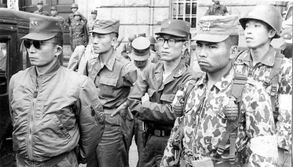Most negatively, the coup can be waved-away as a power grab by ambitious mid-level figures in the military.
Most positively, [it was] a successful attempt to eliminate corruption/backwardness, resulting in prosperity.
It seems to me that the positive view of this coup predominates (based on my [limited] observations of Korean politics and affairs, on my informal polling of dozens of students I have had over the years, and on my observation of the elections of 2012). There are two caveats: #1: It is viewed less positively by younger Koreans, born after 1980 or so. #2: It is viewed much more negatively in Jeolla Province (but that’s a different, more complicated story). The anonymous but influential Korean-American blogger who runs “Ask a Korean”, calls General Park a “fascist” but even he credits him with the economic boom.
I can offer a few ideas based on what I have learned, with my own conjectures mixed in.
(a) From Stagnant Poverty to Economic Boom: Poverty hurts. South Korea in the ’50s showed no sign of being able to raise itself up, out of Third-World status. Park’s government aggressively/successfully pursued economic growth. This is the standard reason given for support for Park. I think it may, though, be the most superficial of all.
(b) National Prestige: South Korea is one of the few states that has faced a long-term major threat to its existence, i.e. a competing Korea. Today, it’s easy to wave away North Korea as a backward, despotic, alienated and “weird” place. North Korea was not always backward, though. It was superior to the South for many years. Into the 1970s, say the Korea experts, the North Korean economy was clearly stronger. When comparing the ROK and DPRK militaries, the latter was stronger, one-to-one, well into the 1980s, I’ve read. Thus, when the coup was being plotted in 1960, South Korea seems to have existed solely because of U.S. protection and largesse, understandably a humiliation. By the time Park Chung-Hee was killed in 1979, the idea of South-Korea as a “U.S. satellite” was mostly untrue, I think.
(c) The First Strong Leader of the ROK: The coup of May 16th marked, people tend to believe, the start of the first era of decisive leadership in the ROK’s history. From 1948 to 1960, South-Korea’s leader was an elderly man named Syngman Rhee (리승만, as it was written in Korean at the time, now 이승만). Rhee is considered a pretty bad leader by Koreans. My impression from reading about him is that he was part buffoon and part autocrat, a toxic combination. His mismanagement led to his overthrow and exile in 1960, followed by an era of instability.
(d) Plain–Old Nostalgia: All the above is well-and-good, but I think all three may be partially…”pretexts”. Something else may be more fundamental. Consider the exit-polling for last year’s election, in which Park Geun-Hye [박근혜] was elected president. She is the daughter of Park Chung-Hee. The outcome by age-group tells the story:
The Vote in the 2012 South Korean Presidential Election by Age Group [Park Geun-Hye vs. Moon Jae-In]
Voters Born Before 1955: For Park by a 3-to-1 Margin (Three in this age group voted for her, to one against)
Voters Born Before 1965: For Park by a 2-to-1 Margin (Two in this age group for her, to one against)
____________________________________________________________________________________________________________
Voters Born After 1975: Against Park by 2-to-1 Margin (Two in this age group voted against her, to one for)
Voters Born After 1985: Against Park by 2-to-1 Margin (Two in this age group voted against her, to one for)
The division is sharp. It seems hinged on the question: “Do you remember South Korea under Park Chung-Hee?”
In general, if your answer is “Yes, I remember”, then you voted for Mrs. Park. The more years of your life spent under the Park “dictatorship”, the more likely you were to vote for Mrs. Park in 2012. If your answer is “No, I don’t remember this country under General Park” (I was either not yet born, or was too young), then you voted against Mrs. Park. / Those who would have remembered the 1950s era itself (as a contrast to the post-coup era) supported Mrs. Park totally-overwhelmingly, more than three-to-one. It is even starker if we discount the voters from the Southwest, who bloc-vote against conservative candidates because of a regional rivalry. My rough calculation is that in Korea outside the three southwest jurisdictions, voters born before 1955 supported Park Geun-Hye by five-to-one.
It was a “nostalgia election”. There happen to be more older than younger voters, and thus was the election decided.
Why would nostalgia be such a powerful force in South Korea? I have some speculations on that, too. I will comment on that another time.

